Supporting Autistic Adults in Developing Career Preparation Skills
Fostering Career Growth in Autistic Adults: Strategies and Supports

Understanding the Landscape of Employment for Autistic Adults
Autistic adults face unique challenges and opportunities in their pursuit of meaningful employment. While many experience significant barriers, a variety of resources, programs, and evidence-based strategies are available to support their career development. This article explores the obstacles faced by autistic individuals, effective support mechanisms, resources at hand, and best practices for fostering sustainable, fulfilling careers.
The Employment Landscape for Autistic Adults
What are the main challenges faced by autistic adults in developing career skills?
Autistic adults often encounter a range of obstacles that can hinder their ability to develop and advance in their careers. Social communication differences may make it difficult to connect with colleagues, understand office dynamics, or participate in networking events. Sensory sensitivities can also affect their comfort and performance in bustling or noisy work environments.
Executive functioning issues, such as planning, organization, and time management, can impede the acquisition of new skills or meeting job demands effectively. Systemic barriers, including workplace stigma and discrimination, often lead to limited opportunities for promotion or job stability.
Access to tailored training programs, mentorship, and workplace accommodations remains limited in many settings. Gaps in educational backgrounds and employment histories can further reduce prospects for career growth.
Health challenges like burnout, anxiety, and the need for routine can also impact job retention and progression. Despite these difficulties, many autistic adults possess strengths such as meticulous attention to detail, persistence, and honesty.
Implementing inclusive workplace policies, providing personalized supports, and increasing awareness can help unlock employment and growth opportunities. Recognizing individual strengths and fostering supportive environments are vital steps toward enabling autistic adults to achieve meaningful career development.
Supportive Resources and Programs Available
Numerous resources and programs are accessible to assist autistic adults in preparing for and securing meaningful employment. Vocational training options are designed to develop workplace skills and build confidence, often tailored to individual interests and abilities. Programs such as Project Search and internships in community settings enable hands-on experience, helping individuals explore careers and gain practical skills.
Employment support services are crucial for ongoing assistance. Services like the Job Accommodation Network (JAN) and vocational rehabilitation counselors provide advice on workplace accommodations, resume building, interview preparation, and job matching. These services are tailored to address the unique challenges faced by autistic job seekers, promoting retention and career growth.
Government initiatives play a pivotal role. Programs such as Ticket to Work and the Workforce Innovation & Opportunity Act (WIOA) offer training, supported employment, and transition planning. These federally funded schemes seek to increase employment participation and facilitate access to supportive employment services.
Non-profit organizations contribute significantly by offering comprehensive employment toolkits, job portals, webinars, and community engagement resources. Autism Speaks’ Employment Toolkit and Autism Society’s employment networks help individuals identify their strengths, set career goals, and connect with employers committed to inclusive hiring practices.
Online platforms like TheSpectrumCareers—created by Autism Speaks—serve as job marketplaces dedicated to connecting autistic candidates with employers. These portals typically feature roles in technology, administrative support, and community-based positions, emphasizing inclusive work environments.
Supported employment programs, such as those offered by Autism Workforce and Aspire to Work, focus on creating structured job placements with ongoing coaching and mentoring. These initiatives underscore the importance of adaptive workplace environments where autistic employees can thrive.
In summary, from vocational training and employment services to government-led initiatives and nonprofit programs, multiple resources work together to foster employment opportunities for autistic adults. Leveraging these tools can lead to increased independence, job satisfaction, and career advancement.
Effective Strategies for Career Development
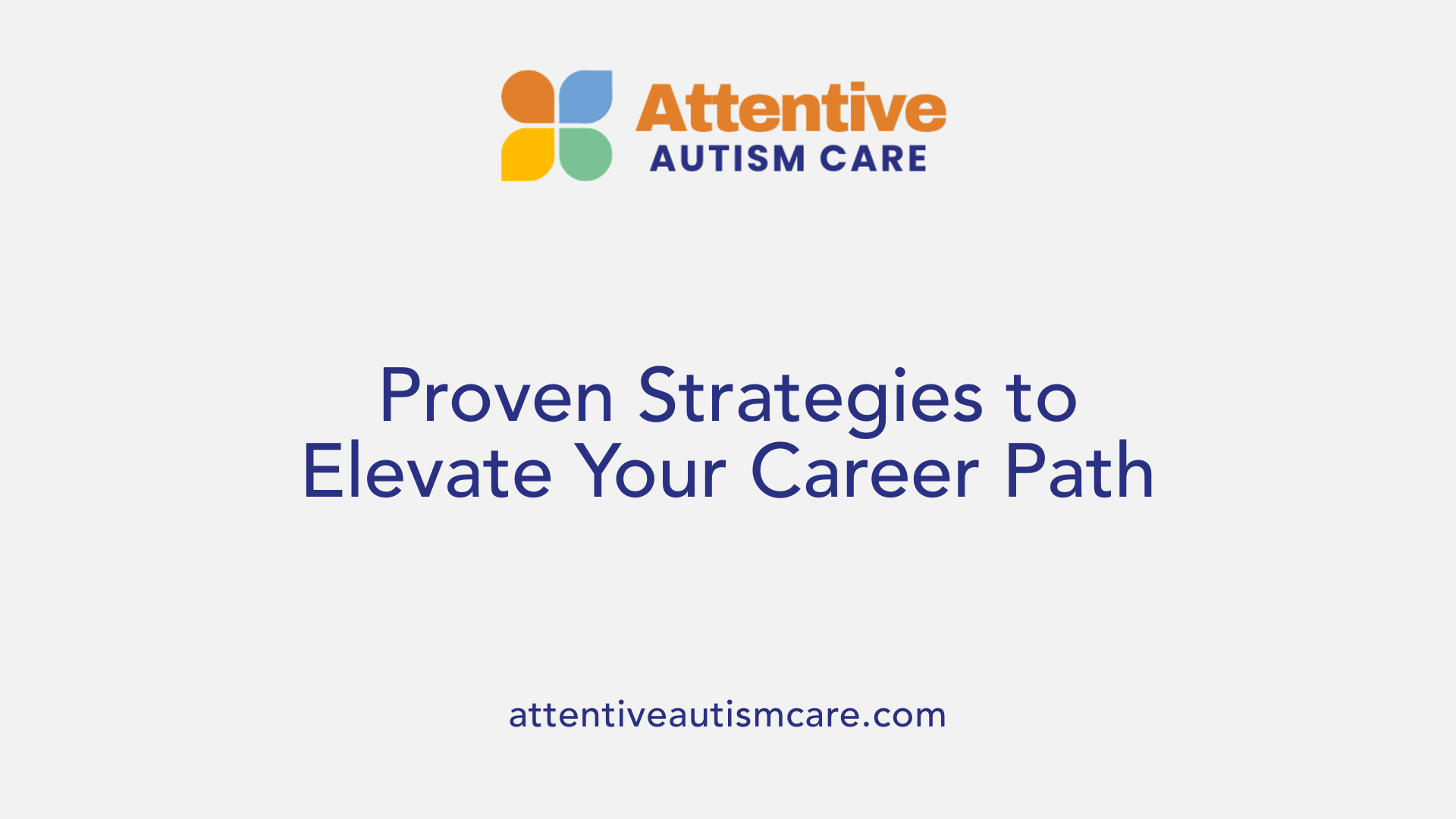
What evidence-based strategies support career development in autistic adults?
Supporting the career growth of autistic adults involves a combination of tailored workplace accommodations, targeted training, and structured mentorship. One of the most effective approaches is implementing adaptations within the work environment to cater to sensory sensitivities and enhance productivity. For example, visual aids, noise-canceling headphones, and flexible schedules can help mitigate sensory overload and create a comfortable space for work.
Structured training programs aimed at increasing self-awareness and advocacy play a crucial role. The Autism Speaks 'Workplace Inclusion Now' (WIN) program provides free online courses that teach self-advocacy, disclosure of autism, and understanding workplace differences. These educational resources empower autistic individuals with the knowledge needed to navigate office environments confidently.
Mentorship opportunities and skill-building initiatives are also beneficial. Connecting autistic employees with mentors fosters professional development, helps build social and communication skills, and provides guidance on workplace expectations. Supporting tools like the Autism Speaks Employment Toolkit offer self-assessment resources and practical advice for job searching and sustaining employment.
External organizations contribute valuable resources and strategies, including supported employment practices from agencies such as SAMHSA, which focus on creating consistent routines, clear expectations, and inclusive workplace cultures. These elements collectively help autistic adults not only gain employment but also advance their careers by creating a supportive and understanding environment.
Creating predictable routines and establishing clear, achievable goals can greatly support individuals in managing their work responsibilities. Promoting a positive organizational culture that recognizes and values neurodiversity fosters inclusion and allows autistic employees to reach their full potential.
In summary, evidence-based strategies such as workplace accommodations, self-advocacy training, mentorship programs, and organizational support collectively promote sustainable career development for autistic adults.
Barriers and Facilitators of Employment
What are the barriers to employment and career progression for autistic adults?
Autistic adults often face numerous hurdles that hinder their entry into and advancement within the workforce. One prominent barrier is societal stigma, which can lead to discrimination and preconceived notions about their capabilities. Many employers lack awareness or understanding of autism, resulting in environments that might not accommodate or support neurodiverse employees.
Communication challenges are also significant. Difficulties with social interaction and workplace networking can prevent autistic individuals from building meaningful professional relationships, which are vital for career growth.
Inflexible or unaccommodating work environments further restrict employment opportunities. An absence of tailored supports—such as job coaching or workplace adjustments—can make it hard for autistic adults to sustain employment.
Systemic issues contribute to these barriers as well. Fragmented employment support systems and biases in recruitment processes often exclude qualified candidates. Limited access to diagnosis, transportation, and specialized employment services can also impede career development.
Additional obstacles include gaps in education or employment histories, which may arise from early educational difficulties, leading to lowered confidence or missed opportunities for skill development.
What are the facilitators to employment and career progression for autistic adults?
On the positive side, personalized and proactive support plays a vital role in improving employment outcomes. Tailored interventions, such as vocational assessments and individual coaching, help identify strengths and areas needing development.
Workplaces that foster inclusive and understanding cultures are crucial. Training for employers on autism awareness, combined with accommodations like flexible schedules and accessible workspaces, significantly enhance retention and satisfaction.
Support from supervisors and colleagues, along with opportunities aligned with an individual’s interests and talents, motivate sustained employment. Internships, volunteering, and work-based learning experiences also serve as effective pathways to paid jobs, allowing autistic adults to explore careers and develop relevant skills.
Systemic efforts to reduce stigma—through public awareness campaigns and inclusive policies—are essential in creating welcoming environments. Support networks, including employment programs and advocacy organizations, further facilitate access to job opportunities and career advancement.
What systemic and organizational strategies can support autistic adults?
To address systemic barriers, governments and organizations should promote inclusive hiring practices and improve access to comprehensive support services. Initiatives like the WIOA (Workforce Innovation & Opportunity Act) and specialized programs from organizations like Autism Speaks are designed to assist autistic individuals in gaining and maintaining employment.
Within organizations, implementing autism-friendly policies, offering training programs, and establishing mentorship opportunities can foster a more supportive work environment.
Combining these efforts—personalized supports, inclusive policies, employer education, and systemic reforms—can significantly enhance employment prospects, career growth, and workplace satisfaction for autistic adults.
Research Insights on Employment Success Factors
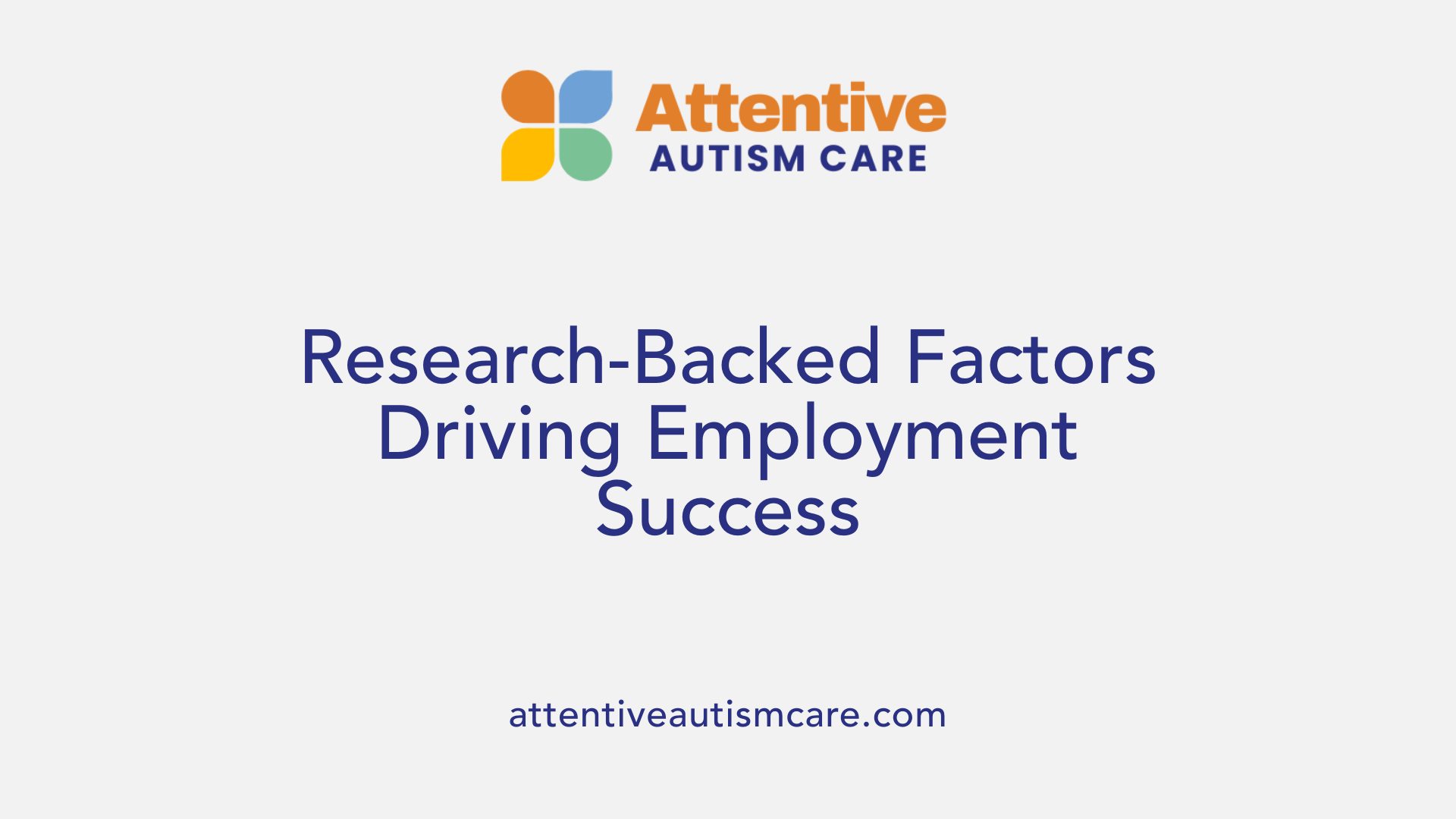
What research insights exist on career progression and employment success factors for autistic adults?
Recent studies have highlighted several factors that play a vital role in promoting employment success among autistic adults. Supportive work environments are essential; workplaces that foster understanding, acceptance, and flexibility can significantly improve job retention and satisfaction.
Interventions tailored to individual strengths, such as job coaching, mentorship, and skills development programs, have demonstrated positive impacts. Early and sustained employment support helps individuals build confidence and adaptability, leading to better long-term outcomes.
Programs like TEACCH and Project SEARCH exemplify effective strategies that emphasize inclusivity and productivity within corporate and organizational settings. These initiatives focus on creating environments where autistic employees feel valued and supported.
Community involvement and addressing social and environmental barriers are also critical. Facilitating social networking, reducing stigma, and promoting awareness contribute to a more accepting workplace culture.
A person-centered approach that looks at each individual’s unique strengths, preferences, and well-being is vital. Such strategies involve understanding employee needs, offering accommodations, and fostering ongoing professional development.
Overall, research emphasizes that integrating these factors — support, tailored interventions, and inclusive policies — can significantly enhance opportunities for career growth and success among autistic adults.
Designing Support Services for Career Skills Development
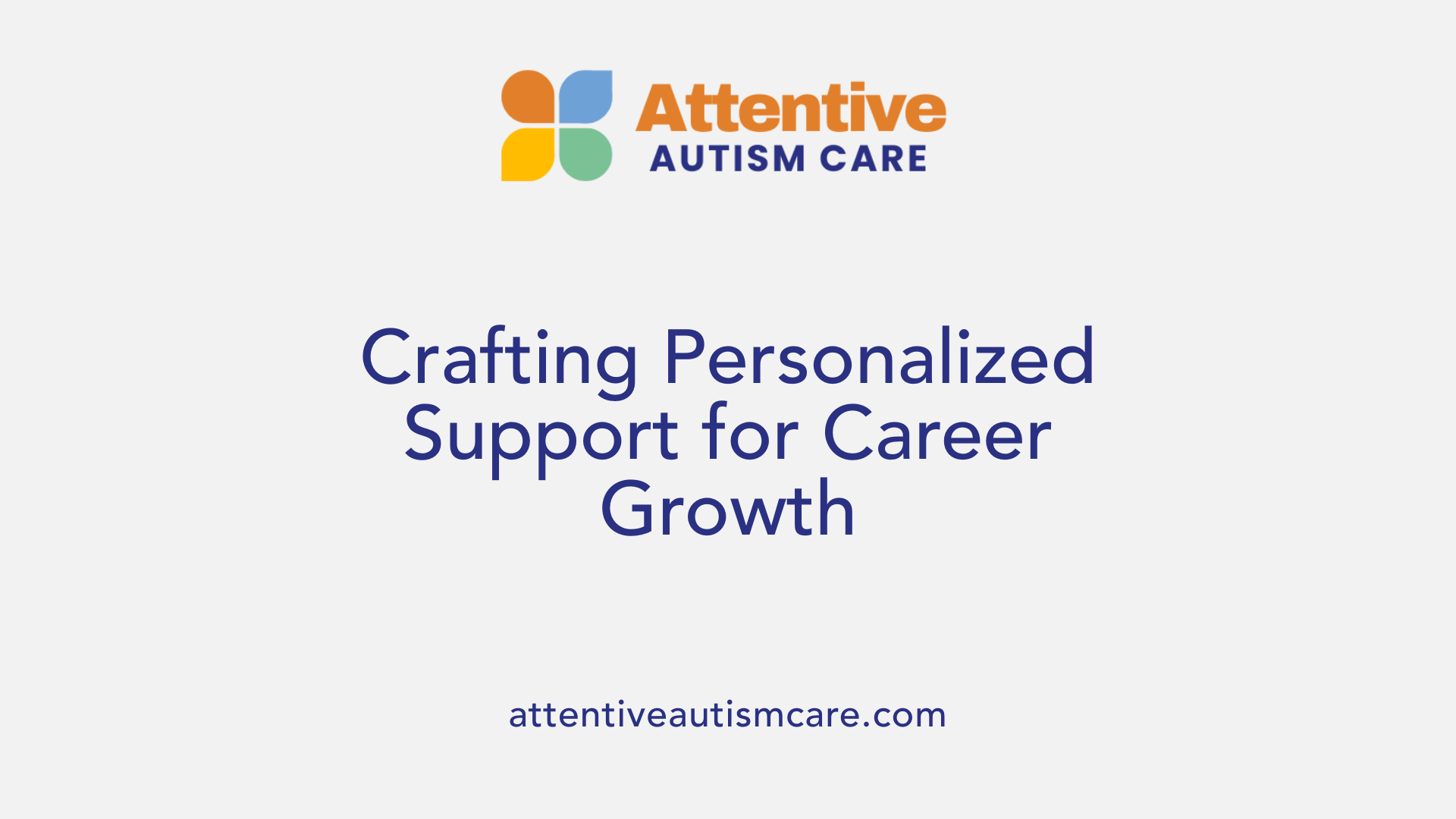
How can support services be designed to effectively promote career skills in autistic adults?
Effective support services for autistic adults need to be highly personalized. Tailoring programs to fit individual strengths, interests, and sensory preferences helps ensure that the training is relevant and engaging.
Practical, real-world skill development is crucial. Workplace-based supports, like job coaching and structured routines, can make a significant difference in building confidence and competence. These supports provide familiarity and predictability, which are often valued by autistic individuals.
Incorporating accommodations and flexible work environments promotes success and comfort at work. For example, providing noise-canceling headphones or quiet workspaces can help individuals manage sensory sensitivities.
Programs such as Autism Speaks’ Workplace Inclusion Now(TM) (WIN) aim to increase employer awareness and foster inclusive practices. These initiatives also empower autistic adults through self-advocacy training and guidance on disclosure.
Supporting career paths that offer predictability and structure—like data analysis, information technology, skilled trades, or research—matches many autistic strengths and preferences.
Collaborative efforts are vital. Partnerships with employers, family members, and employment networks help create supportive environments. These collaborations can facilitate mentorship, ongoing training, and sustainable employment opportunities that are customized for each individual.
Overall, designing these services with flexibility, inclusivity, and an understanding of unique needs not only promotes skill development but also enhances chances for meaningful, long-term employment.
The Role of Education and Transition Planning
What is the significance of early intervention and transition planning for autistic youth entering adulthood?
Early intervention plays a crucial role in setting a strong foundation for autistic individuals as they approach adulthood. Under the Individuals with Disabilities Education Act (IDEA), schools are required to develop comprehensive transition plans and provide support services starting from age 14. These plans are tailored to help students with autism prepare for employment, independent living, and community engagement.
Transition services include various programs designed to address unique needs, such as Pre-Employment Transition Services (Pre-ETS). These services introduce students to career exploration, provide opportunities for work-based learning, and develop essential social and self-advocacy skills.
Engaging students actively in decision-making about their future fosters motivation and increases the likelihood of success. When students participate in setting realistic, interest-based goals aligned with their strengths, it helps them build confidence and clarity about their career paths.
Addressing gaps in educational and employment histories early on is vital. Tailored transition programs enable students to gain relevant skills, experience, and clarity on their interests, which are essential for lifelong career development. Moreover, such early planning encourages self-determination—a vital trait for navigating the workforce and ensuring that individuals pursue careers that truly resonate with their passions.
Overall, early intervention and thoughtful transition planning significantly improve employment outcomes for autistic youth. They lay down a structured pathway towards meaningful participation in the workforce and community life, emphasizing individual strengths and interests to foster long-term success.
Building Micro-competencies and Soft Skills
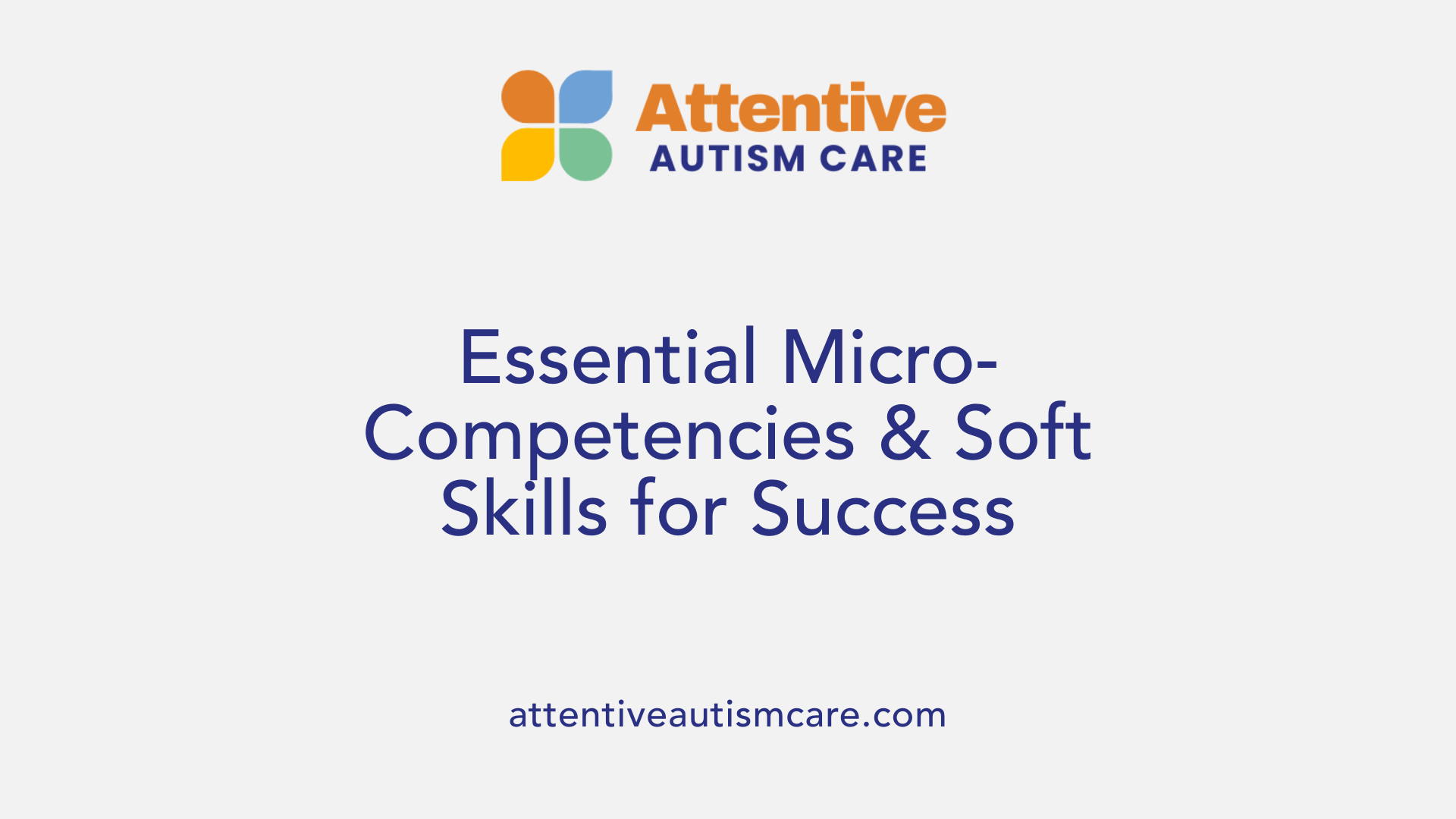
What key skills are essential for autistic adults to succeed in the workplace?
For autistic adults aiming to thrive professionally, mastering specific micro-competencies and soft skills is vital. These include problem-solving, effective communication, collaboration, and self-advocacy.
Building core micro-competencies such as problem-solving involves teaching individuals how to identify issues, evaluate options, and implement solutions. This skill helps manage daily work challenges and enhances independence.
Effective communication is another crucial area, focusing on verbal and non-verbal skills, active listening, and clear articulation of needs and boundaries. Developing these skills through structured training and real-world practice boosts confidence and workplace integration.
Self-advocacy empowers autistic adults to seek necessary accommodations, express their interests, and participate actively in decision-making processes. Coaching sessions designed around self-awareness and confidence-building can significantly improve their ability to navigate workplace interactions.
Collaboration and professionalism—such as time management, adaptability, and conflict resolution—are essential for career growth. These soft skills are best developed in safe environments that offer constructive feedback and tailored support.
Programs that focus on these skills often involve engaging learners in role-playing, mentorship, and real workplace scenarios, which reinforce practical application. Customizing these development efforts to individual interests enhances motivation and the likelihood of retaining employment.
In summary, fostering these core competencies prepares autistic adults to manage work tasks effectively, advocate for themselves, and build meaningful careers, ultimately promoting successful and inclusive employment outcomes.
Family and Community Support Impact
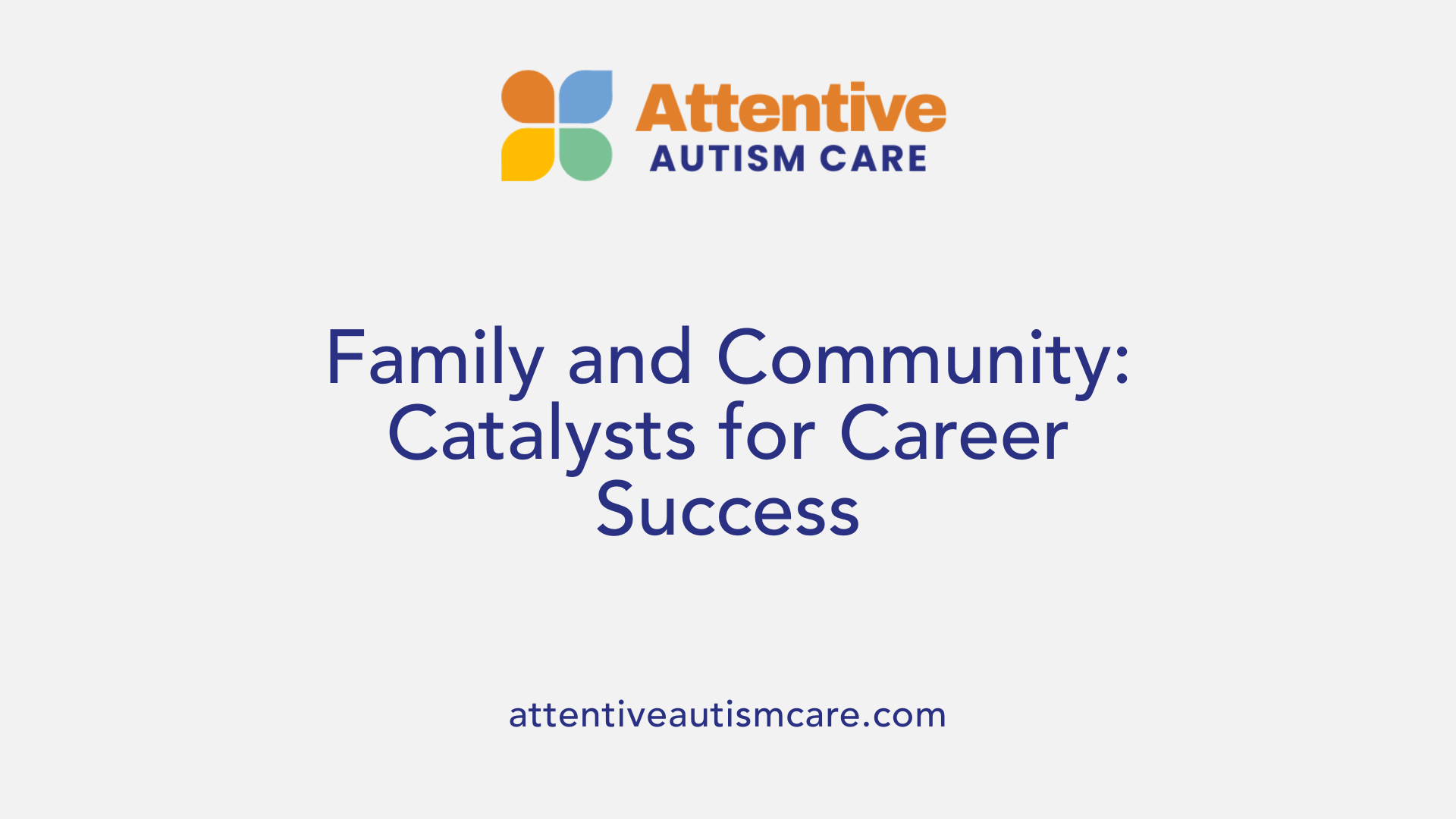
How does family involvement influence career development for autistic adults?
Family involvement is a fundamental factor in shaping the career paths of autistic adults. Supportive families contribute emotionally by encouraging confidence and resilience, which are essential as autistic individuals face various challenges in the workplace.
Families also play an advocacy role, helping their loved ones access tailored employment services and navigate complex systems such as vocational rehabilitation, education, and job placement programs. By actively participating in planning and decision-making, families can help set realistic career goals aligned with the individual’s interests and strengths.
In addition, families can foster early interest in career-related activities, such as volunteering, internships, or community projects. This early exposure helps build soft skills like communication, teamwork, and self-advocacy, which are critical for work success.
Community engagement complements family support by connecting autistic adults with mentorship programs, support groups, and advocacy organizations. These networks provide role models, share valuable resources, and promote inclusive attitudes within workplaces and society at large.
Overall, active family involvement alongside community support creates an enabling environment that encourages sustained motivation, enhances skill development, and increases employment opportunities for autistic adults.
Conclusion and Future Directions
Ongoing research continues to stress the importance of comprehensive, person-centered approaches to enhance employment prospects for autistic adults. This includes integrating employer training, workplace accommodations, and community support systems to create more inclusive environments.
Policy initiatives such as the Workforce Innovation & Opportunity Act (WIOA) and the Ticket to Work program offer valuable frameworks for expanding access to tailored employment services. These policies aim to reduce barriers and promote sustainable employment pathways.
Best practices in fostering inclusive employment environments involve cultivating organizational cultures that value diversity, providing specialized training programs, and establishing mentorship opportunities. These strategies help autistic adults develop skills and confidence in their roles.
Looking ahead, collaborative efforts among educational institutions, employers, policymakers, and families are essential. Building these partnerships will help create long-term, scalable models for employment support.
Technological advancements also play a vital role. Digital tools like online training modules, virtual mentorship programs, and adaptive work resources increase accessibility and engagement for autistic individuals.
By focusing on these areas, future initiatives can ensure that autistic adults receive the necessary support throughout their careers, enabling them to reach their full potential in the workforce.
Empowering Autistic Adults for Meaningful Employment
Supporting autistic adults in developing their career skills involves a multifaceted approach that encompasses early intervention, tailored support services, inclusive workplace policies, and active community engagement. Recognizing their unique strengths and addressing systemic barriers are essential for creating equitable employment opportunities. Combining evidence-based strategies with innovative programs and systemic policy reforms will pave the way for more autistic adults to achieve meaningful career growth, independence, and fulfillment in the workforce.
References
- Career progression for autistic people: A scoping review
- Preparing Adults with Autism for Employment Success
- Tips for autistic job seekers to find the right job
- Creating a Path
- Employment Resources for Autism - Websites and Program
- Employment and Training for Adults with Autism
- Employment and Career Development Among Autistic Adults




































































































